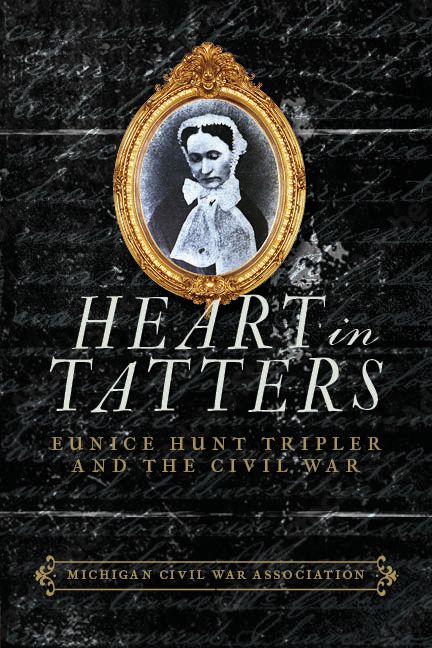Eunice Hunt lived during tumultuous times. Youth in Washington, D.C., brought her into personal contact with Presidents Andrew Jackson and Martin Van Buren, famous military leaders including Winfield Scott, and other notable persons in America’s early history.
In a recently released biography, Heart in Tatters: Eunice Hunt Tripler and the Civil War, editor Jack Dempsey—on behalf of the Michigan Civil War Association—takes readers deep into the fascinating life of Eunice Hunt Tripler.
Descended from patriots who fought in the Revolution and the War of 1812, Eunice knew first-hand the costs of military service. Still, she fell in love with and married a U.S. Army surgeon who was sixteen years her senior. Of their nine children, five predeceased her. Dr. Charles Stuart Tripler provided medical care to troops in Florida, Louisiana, on the Pacific Coast, during the Mexican-American War, and at a major Army recruiting base in Kentucky on the eve of the Civil War. As the first medical director of the ill-starred Army of the Potomac, he was charged with the health of the largest American armed force ever created. Eunice aided his office work, invested in Congressional reform of the Medical Bureau, and lobbied President Abraham Lincoln and Major-General George B. McClellan throughout her husband’s career.
Widowed in 1866 by her husband’s painful death from cancer, she spent the long remainder of her life pressing for recognition of his service and remuneration as his surviving spouse for the contributions he made to the U.S. victory in the War of the Rebellion. Experiencing national and personal tragedies, her fortitude and spirited character become evident throughout these revealing and intimate reminiscences.
“[Eunice] truly was her husband’s soulmate, proud of his achievements, zealous to see his talents fully realized on behalf of his patients and the troops under his care,” said Dempsey. “She was proud of how he took care of old General Winfield Scott, even though it wasn’t his direct responsibility, and notwithstanding her issues with Scott personally. Dr. Tripler’s career suffered unfairly from political skullduggery, and she spent nearly a half century persistently seeking acknowledgment of how he had improved the health of the Army. She was a faithful champion of his legacy.”
In turn, Eunice unwittingly became a champion of her own legacy, both inside and outside of the household.
“By her support, direct and indirect (raising the kids), she helped him be the best caregiver possible,” said Dempsey. “Only a few women had the strength of character to lobby top officials—it wasn’t seemly in that era. She didn’t let it hold her back. As for the children, she was completely invested as a loving mother. Her own mother helped by taking the kids into her charge when necessary. That her final decade was spent in the Nebraska home of a daughter and son-in-law, who was the ghost-writer for her memoir, shows the close bonds she had with that generation.”
Heart in Tatters is the first in a series of books to be published by the Michigan Civil War Association. The organization gave careful consideration as to the topic of the first release.
“As the publications committee of the MCWA considered our possibilities for the first of what we plan to be a regular series, we decided an edition of [Eunice’s] Civil War reminiscences would be an excellent inaugural volume,” said Dempsey. “More books have been [written] about southern than northern women, and this would help rectify that imbalance. We Northerners have a lot to be proud of.”
The MCWA has earmarked proceeds from book sales for the Michigan monument at the Antietam National Battlefield and to educate the public about Michigan’s prominent role in the Union triumph in the Civil War, Dempsey said.
“The more books we issue and sell, the faster the fundraising will reach its goal. No one else is doing a specific series on the Michigan Civil War experience like this. We’re inspired and excited to be engaged in this great work.”
Dempsey has engaged with many organizations and causes over the years relative to the Civil War. One effort is particularly important to him.
“I was most honored to serve in the Michigan Civil War Sesquicentennial effort,” said Dempsey. “Such commemorations come along every 50 years, and all of us involved felt privileged to call the attention of our fellow Michiganders to the great legacy left us by the Civil War generations. What we’re doing now in the MCWA is a direct outgrowth of that—and so we continue in the cause of hallowing the sacrifice of our forebears. One soldier in every seven did not come home from the war, and the impact on the home front was profound.”
Dempsey is available to give presentations on the topic of the Civil War as he did recently in Detroit at historic Fort Wayne. Anyone interested in having him speak to their group or organization may contact him at jack@jdbooks.org.
Heart in Tatters: Eunice Hunt Tripler and the Civil War is published by Mission Point Press of Traverse City, Michigan. The hardcover edition retails for $19.95 and can be purchased here.


